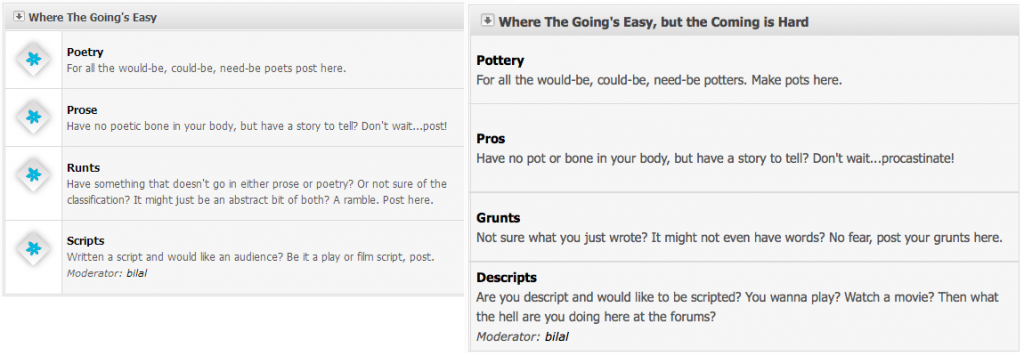(Posted by Omer Wahaj, Managing Editor of Papercuts)
This year, I decided to play a prank on DWL. The idea had actually come to me last year, in April 2012. Being inspired by Google, YouTube and the various other websites that prank their users on April 1, I thought it would be funny to change the names and descriptions of some of the boards on our forums to parodied versions of the originals. The joke would be meant for our users, who I hoped would enjoy it in keeping with the spirit of the day. I emailed the DWL administrator, Shehla, but the brain spark had come too late and it was already past half the day in Pakistan. We decided that we’d do it next year.
So this year, which is last year’s next year, I emailed Shehla again and we put our evil plan into action. At midnight, Pakistan Standard Time, Shehla made the changes.



Up until 6pm the next day, only two forum members had noticed that anything was different. If anyone else had, they hadn’t pointed it out. That’s when I decided to email Afia, the Editor of our magazine, who was busy vacationing in Sri Lanka completely oblivious to our scheme. I told her that the forums were messed up and we needed to email our webhosting providers to let them know that DWL’s security had been breached. She thought I was April Fooling her and didn’t even bother to log on to the forums. I also tweeted Waqas, another member of our core team. This is how that conversation went:


So far, our prank did not seem to be working well. But then our luck changed. Shehla was busy moving and she did not have a chance to change the text back. So when Waqas and Afia logged into the forums on 2nd April, the parodied names on the boards were still there. This made the two of them suspicious (and a little panicky). On April 2nd I received an email from Waqas:
“Subject: I guess the forums were hacked
So the titles of most of the categories on the forums are changed and some of the descriptions are altered, too. It’s not April Fools’ day any more. We need to find out who did this and how to get the titles and descriptions back to normal.”
To which Afia replied:
“Whoever did this should be on our team. They’re bloody clever with words. Evidently not a standard hacking job. So, my guesses: [3 potential parties that she suspected may have had reason to play a prank on DWL, whose names we cannot reproduce here for obvious reasons].
Would it be a dumb idea to acknowledge that this has happened and ask the person responsible to step forward because we’d like them on our team?”
What began as a prank on our users ended up fooling our own admin team, and they wanted to recruit the prankster! This was the icing on the cake. Made the whole thing completely worth it, and made the following email (forged to look like it had come from our webhost provider) all the more fun to send to them:
“Subject: Re: Forums Hacked?
Hello DWL Team aka Afia and Waqas (aka Vics),
I just looked over the DWL forums and everything appears to be normal. If you think that the forums were hacked and the names of the original threads replaced with “bloody clever words” then please contact Omer and Shehla because they just pulled a bloody April Fools joke on you!
Hahahahahhahahahaah. April fools, the both of you!
High five Shehla!
P.S. Whoever did this is already on your team.”
The forums are back to their original state now, but our prank’s been put up on the DWL Milestones thread for all posterity.



